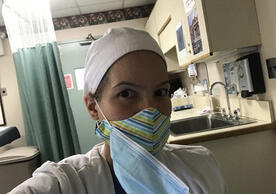
Taina Lopez-Cartagena ’22 DNP is a Family Nurse Practitioner at a Federally Qualified Health Center (FQHC) in the Bronx, New York, which provides care for a high minority and immigrant population. She is an avid volunteer and an adjunct nursing professor at New York University, and she is also a recipient of the prestigious Yale School of Nursing Gruber Nursing Fellowship.The following is an account of her experience working in a clinical setting during the COVID-19 (coronavirus disease) pandemic, as told to Yale School of Nursing (YSN).
This is part of an occasional series of YSN community members sharing their COVID-19 (coronavirus disease) experiences.
YSN: How is COVID-19 affecting your daily work right now?
COVID has added an additional stressor to an already burdened population. I work in an underserved community and COVID appears to have affected this particular community in a disproportionate way.
Due to my patients’ health disparities, they are at more risk, and if exposed, have poorer health outcomes. Consequently, during this medically historical time I have experienced patient encounters with heightened levels of anxiety, depression, manias, pain, and aggression.”
YSN: Have there been any unexpected bright spots throughout your experience?
Yes! One unexpected bright spot was the amount of generosity I have experienced. For example, the lack of personal protective equipment (PPE) has been an ongoing challenge for nursing. Fortunately, a couple of friends were able to donate a substantial amount of cloth face masks to help mitigate the gaps in PPE procurement. I was deeply touched by the gesture, and so were my colleagues.
YSN: If you could tell the public one thing about this pandemic, what would it be?
We are in this together, so let’s support one another by keeping each other safe. Please DO YOUR PART. Adhere to the mandates no matter how cumbersome they may be. It can mean saving a life.
YSN: How can people and institutions best support nurses, midwives, and other frontline healthcare providers?
People can support frontline workers by simply inferring empathic accuracy. We are all facing adversity and hardships daily. Let’s be kind to one another. Regarding institutional support, use Yale as an exemplar. The institution and faculty have been extremely supportive, offering various services, assignment extensions, and pass/fail grading. All of the aforementioned ease the added stressors of the pandemic.
YSN: How do you anticipate carrying your COVID-19 experience forward through the rest of your career?
Moving forward professionally, I anticipate carrying the importance of a preparedness plan and / or emergency preparedness plan as well as the use of continuous quality improvement initiatives during any healthcare situation, whether emergent or system-related, in order to mitigate gaps and suboptimal occurrences.
